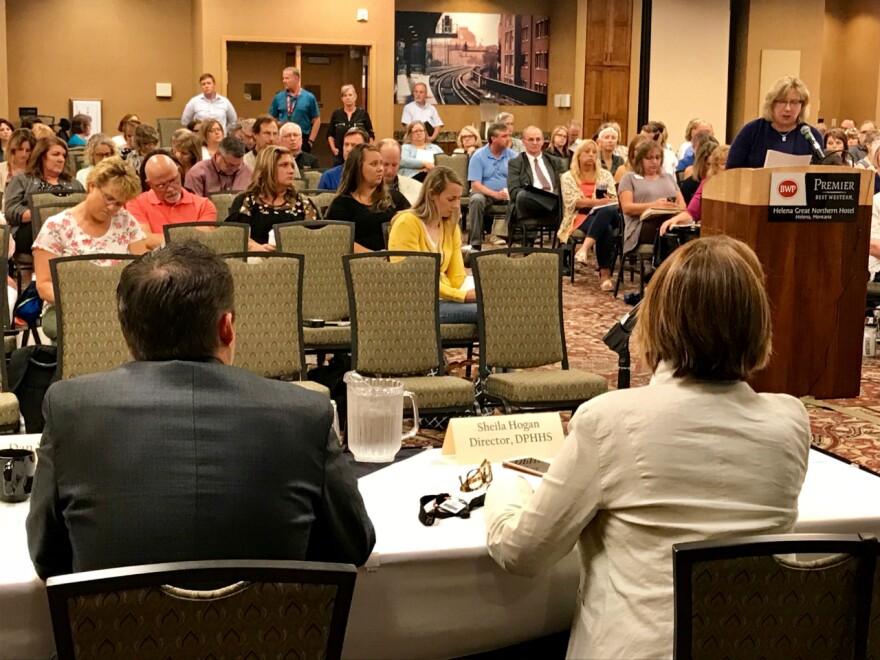Montana’s health department was dealt a major blow in late 2017, when the agency was forced to cut almost $50 million to help balance the state budget.
Mary Windecker of the Behavioral Health Alliance of Montana, an advocacy group representing about 30 addiction and mental health care providers, says that was, “A huge shock to both the mental health and substance use systems in the state of Montana.”
By some estimates, upwards of 100 case managers lost their jobs statewide or left through attrition after their wages were cut. Case managers help people with mental health challenges navigate daily life. The idea is to help them live independently, which is more humane and cheaper than being institutionalized.
When people can’t live independently, they’re sometimes involuntarily committed to a hospital.
Windecker says that following the 2017 budget cuts, involuntary commitments went up by nearly 30 percent in Missoula County alone. After years of generally steady rates, 48 people were committed in 2018, compared to 37 the prior year.
Windecker says the budget cuts were especially hard in rural areas.
“We saw places like Beaverhead County, where they not only lost their mental health center, they lost their job service and they lost their office of public assistance. Lincoln County was another one that was deeply impacted. And then just the case where someone can’t travel; they don’t have the money, they don’t have a car. How do they get to the closest urban area to be able to be treated?”
When an involuntary commitment is required, the point of first contact is often law enforcement.
“I mandate that every single one of my deputies and detention officers go through crisis intervention training,” says Gallatin County Sheriff Brian Gootkin. He says his deputies intervene daily in local mental health-related calls.
“There’s no crime – in many cases there’s no crime – but there we are, sort of as a mediator trying to respond, make sure that everyone's safe, but then also, the next step that we’ve started doing in recent years is getting those folks to the help they need.”
According to Gootkin, a single mental health-related call can take his deputies hours to unravel.
"And life doesn’t stop while you’re taking care of that; whether it be thefts, domestic assault calls – you name it. So these types of calls are not just show up, take care of it and leave. They take time.”
They also take money. Gootkin says the Gallatin County Sheriff’s Department transported 106 patients to various treatment centers around Montana last year. That amounted to over 400 staff hours, not to mention mounting overtime costs and wear and tear on department vehicles.
"So we’re talking, probably to the Gallatin County taxpayer – and this is very, very conservative – easily $40,000. The numbers are pretty astounding.”
“It costs about $3,000 a year to treat somebody in the community," Windecker says. "They move into a higher level of care, either that’s an emergency department where they’re then referred to crisis care or they’re referred to a behavioral health unit in one of the hospitals, or they’re sent to the Montana State Hospital – all of those things cost a lot more than treating them in their community.”
Windecker says it costs $550 per day to treat these patients at the Montana State Hospital and on average, $2,300 per day for treatment in a hospital setting. She says people who are involuntarily committed sometimes balance out emotionally, or sober up, and no longer need commitment by their court dates. They’re then released back out into the world on their own and unsupported.

Deputy Missoula County Attorney Suzy Boylan says it then becomes a question of ‘where do they go?’ Many patients lack access to stable housing.
“And if they have housing, they need case managers to help them stay stable in their housing. And so it’s kind of a vicious cycle. If you’re missing one piece of the puzzle, then the other pieces of the puzzle are not going to stay in place.”
Windecker believes the budget cuts that shrunk Montana’s pool of case managers dealt serious and long-term damage to that vulnerable population.
"For those people who were really hanging on by their fingernails anyway, they’ll never get it back. I think we’ll be able to save maybe 90 percent of the system if we can reallocate funds and get it back in there; but there’s going to be those people we never find again.”
State lawmakers this session are attempting to backfill some of the budget cuts made in late 2017, considering a bill that would allocate $1 million for substance use disorder treatment and more than $3 million for targeted case management services. Welcome news, but as Mary Windecker observes, a lot of agencies will be vying for those limited dollars.
Boylan, meanwhile, points out the number of involuntary commitment petitions is once again spiking after a brief lull during the first several weeks of the new year.



